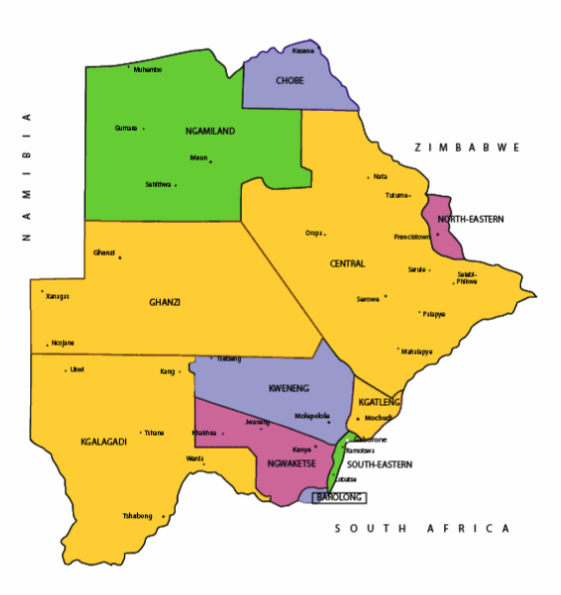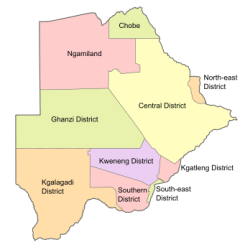Places and their polling stations in Gabane-Mmankgodi, Botswana
322 Mmankgodi North
1480 Anglican Church
1481 Mmonye Primary School
1482 Letlole Primary School
1483 Tloaneng Primary School
1484 Day Centre At Goo-Nku
1485 UCCSA Church
323 Mmankgodi South
1486 Roman Catholic
1487 United Pentecostal Church
1488 Community Hall
1489 Mmokolodi Primary School
1490 Phiriyabokwete Mobile Clinic
1491 Mmokolodi Kgotla
324 Gabane South West
1492 Gabane Community Hall
1493 Gabane Clinic
1494 Gabane Post Office
1495 Gabane New Primary School
325 Gabane North West
1496 Gabane Main Kgotla
1497 Tshwaragano Brigade Centre
1498 UCCSA Church
1499 Mophakane Mobile Stop
326 Gabane North East
1500 Holly Brown Day Centre
1501 Gasiko Primary School
1502 Tent At Rabodibane Kgotla
1503 Open Space Behind Lesirane Industrial Site (Tent)
327 Gabane South East
1504 Pule Primary School
1505 Holy Apostolic Church
1506 Gabane Private School
1507 Tent at Open Space (Opposite Dolly Sam’s Day Care Centre)
328 Metsimotlhabe
1508 Monageng Cattle Crush
1509 Ikageng JSS
1510 Metsimotlhabe Primary School
1511 UCCSA Church
1512 Community Hall
329 Diagane
1513 Serameng Primary School
1514 Tent at Diagane Kgotla
1515 Thuto Primary School
330 Lesirane
1516 Lesirane Primary School
1517 Tent at Lesirane Cellular Tower
1518 Block 7 Extension (Open Space) Next To Moomo Tree
331 Tsolamosese
1519 Tsolamosese Kgotla
1520 Aedume Park
1521 Tent at Tsolamosese (Open Space)
Reference: iec.gov.bw/index.php/electoral-districts/polling-stations.html
Botswana
Botswana is a country in Africa. It is topographically flat, with approximately 70 percent of its territory being the Kalahari Desert.
It is bordered by South Africa to the south and southeast, Namibia to the west and north, and Zimbabwe to the northeast.
Capital: Gaborone
Currency: Botswanan Pula
Official language: English
Population: 2.588 million (2021) World Bank
Dialing code: +267
Gross Domestic Product: 17.61 billion USD (2021) World Bank
Botswana’s ten districts are:
- Southern District
- South-East District
- Kweneng District
- Kgatleng District
- Central District
- North-East District
- Ngamiland District
- Kgalagadi District
- Chobe District
- Ghanzi District
Botswana’s councils created from urban or town councils are: Gaborone City, Francistown, Lobatse Town, Selebi-Phikwe Town, Jwaneng Town, Orapa Town and Sowa Township.






The name Botswana refers to ‘Land of the Tswana’. The landlocked, Southern Africa country is officially known as the Republic of Botswana.














Botswana is connected to Zambia through the Kazungula Bridge making it the world’s shortest border between two countries.
A country of slightly over 2 million people (2021), Botswana is one of the most sparsely populated countries in the world. It is essentially the nation state of the Tswana ethnic group, who make up 79% of the population.

About 11.6 per cent of the population lives in the capital and largest city, Gaborone.
Formerly one of the world’s poorest countries—with a GDP per capita of about US$70 per year in the late 1960s—it has since transformed itself into an upper-middle-income country, with one of the world’s fastest-growing economies.


The Tswana ethnic group were descended mainly from Bantu-speaking tribes who migrated southward of Africa to modern Botswana, living in tribal enclaves as farmers and herders.




In 1885, the British colonised the area and declared a protectorate under the name of Bechuanaland.
As colonisation stopped, Bechuanaland became an independent republic under its current name on 30 September 1966.


Since then, it has been a representative republic, with a consistent record of uninterrupted democratic elections and the lowest perceived corruption ranking in Africa since at least 1998.

The economy is dominated by mining and tourism. Botswana has a GDP (purchasing power parity) per capita of about $18,113 as of 2021, one of the highest in subsaharan Africa.


Botswana is the world’s biggest diamond producing country.
Its relatively high gross national income per capita gives the country a high standard of living and the third-highest Human Development Index of continental Sub-Saharan Africa (after Gabon and South Africa).
The country has been adversely affected by the HIV/AIDS epidemic. In 2002, Botswana began offering anti-retroviral drugs (ARVs) to help combat the epidemic.
Botswana is a member of the Southern African Customs Union, the Southern African Development Community, the Commonwealth of Nations, and the United Nations.


